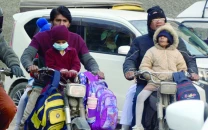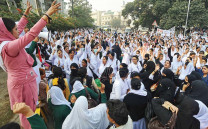Baldia factory fire: A tale of continuous struggle and broken promises
Four years on, families of 260 victims await closure

A woman who lost a relative in the factory fire grieves at the incident’s anniversary in 2015. PHOTO FILE
Sunday (today) marks the fourth anniversary of the fire at Ali Enterprises garments factory in Baldia, one of the deadliest industrial disasters in the world.
Hundreds perished overnight in the incident while the investigation of the inferno has fallen prey to blame games and manipulations and is now likely to go on the backburner.
She has not forgotten even a single statement addressed to them by political leaders.
"I have all of their newspapers cuttings," says Khatoon, talking about the display of sympathy and pledges of justice for the victims' families by those in power.
Despite being an energetic leader in the struggle for justice, Khatoon is easily broken into tears when she mentions her son, Ijaz Ahmed, whom she lovingly called, Ayaan.
"Ammi Kya Pakaya Hai? (Mother, what have you cooked)," was the first thing he would ask Khatoon after coming home from work at night. The aggrieved mother has not lit her stove since that fateful day, relying instead on a nearby café in the hilly Orangi Town vicinity she lives in. She lives alone in her house, measuring 80 square yards or less, with one room and basic furniture and utensils. A portrait of the bespectacled, curly haired Ayaan greets every visitor. "See how fine looking he was…always respecting and caring for others. He was my life. I can't express my pain for him. He is away from me now but I am sure we will reunite up there somewhere, where he'll greet me with open arms," she says sobbingly.
Khatoon is also the senior vice-president of the Ali Enterprises Factory Fire Affectees Association. She feels that Ayaan has left her with the responsibility to save others like him from the fate he met. "I will not give up this struggle till my last breath. I won't retreat no matter how difficult things get."

Struggle for justice
In the movement for justice, Khatoon is joined by others who lost their loved ones in the incident. They all work together as they don't want others to exploit them and use them for ulterior motives.
"We have been used before," reveals Jabir Khan, president of the victims' association. "With limited education and knowledge, we ran door-to-door seeking justice in the early days. Some even took money from us in the name of paving our way to the judiciary and other institutions," he recalls.
After one and a half year, the victims approached the National Trade Union Federation (NTUF) which advised them to establish their own organisation and lead the movement. Since then, the victims are approaching courts, the International Labour Organization and others to seek justice. "This was the reason that the victims themselves filed litigation against the major European buyer of the factory, KiK, in a German court," he shares.
KiK, which stands for Kunde ist Konig - German for customer is king - is a European cloth discounter headquartered in Bonen, Germany. The company reportedly procured more than 70% of the products made at the ill-fated factory.
It has been accused of overlooking workers' safety - a responsibility which it was obligated to share with the factory owners.
It is the first instance that people offshore have sued a company based in Europe, says Khan, adding that NTUF, European Center for Constitutional and Human Rights (ECCHR), Medico International and other organisations working for labour causes have helped them in their pursuit. Three of the victims travelled to Germany in June this year in pursuit of the case, he says.
Justice begins from Germany
The case is being heard by the Regional Court of Dortmund, Germany. Recently, the court has issued an initial decision, accepting jurisdiction over the case and granting legal aid to the claimants to cover the lawsuit cost, informs EECHR vice-legal director Miriam Saage-Maass, adding that the decision is the first step towards dealing with the human rights violations committed abroad by the German companies.
According to the order, a translated copy of which has been obtained by The Express Tribune, the court has directed to collect evidence as well as a written legal opinion on Pakistani law concerning the situation.
The court has also sought information on different subjects, including if there is a legal foundation in Pakistani law for the liability of the respondent - KiK.
Baldia factory fire: A tale of continuous struggle and broken promises
Since the case has raised eyebrows around the world, there has been table talk to settle the matter out of court, with one such ruling announced a few days ago.
According to NTUF deputy general secretary Nasir Mansoor, KiK has agreed to pay $5.15 million as compensation to the victims. An official announcement in this regard is due on Sunday (toady) by the victims’ organisation, he added.
“It is a historic decision. Our movement has paid off but still more needs to be done to avert such incidents.”
The new development seems to be the result of an outcome of the pressure on KiK through various actors, including the German government itself.
During some of the victims’ visit to Germany in June this year, the country’s lawmakers had pledged to support them in their cause. The talks in which the latest decision of compensation was taken were held in Geneva. Before this, a delegation of the ILO visited Pakistan to make assessments of the victims’ claims for compensation.
Baldia factory fire case: Police nominate two suspects from MQM in new charge sheet
The involvement of international actors is also evident from a KiK statement which it emailed to The Express Tribune. In it, the company’s corporate communication officer, Olga Bakanow, had stated that the company did not bear any responsibility for the fire as it believed it was an act of arson over nonpayment of extortion. The company claimed that the responsibility to support those affected falls on the Pakistani government.
Lingering locally
Four years on, the Pakistani government has, however, given little or no importance to the case, according to the victims’ lawyer, Salahuddin Panhwar. He criticised the new charge sheet which blames five people: Muttahida Qaumi Movement’s Hammad Siddiqui, Rehman alias Bhola and three others who are yet unidentified.
The case has been put on the backburner, Panhwar believes, adding that exonerating factory owner Abdul Aziz Bhaila, his sons Arshad and Shahid and others benefits the real culprits. “Most of the deaths were caused as the labourers could not find a way to escape the flames. The gates were closed, the windows were sealed - these facts are on record. Moreover, the factory and most of its workers were not registered with the relevant authorities,” he claimed.
The counsel questions the role and responsibility of government officials who were supposed to keep a check on the working conditions and labour rights in the factory.
Baldia factory fire: Victims’ families decry PM’s empty promises
He says the victims will challenge this move [fewer accused] in court. “There are sufficient evidences that the factory was a death knell with no emergency exit and precarious working conditions.”
Survivors
Of the dozens who survived the fire, most became paralysed or developed various diseases after inhaling the thick smoke that had filled the multi-storey factory.
A young man, Muhammad Hanif, who escaped along with others by jumping off the first floor, describes the tale.
“The emergency exits at the factory were non-existent. They opened into nothing. There was no staircase attached to it.”
The factory, located off the Hub Chowki Road, still stands as a stark reminder of that fateful evening. That day, four years ago, the labourers were eagerly awaiting their wages. Some had to pay their rents and bills while others, like Ayaan, may have planned to buy something for his mother. None of them could finish their errands or fulfill their dreams.
Published in The Express Tribune, September 11th, 2016.


















COMMENTS
Comments are moderated and generally will be posted if they are on-topic and not abusive.
For more information, please see our Comments FAQ